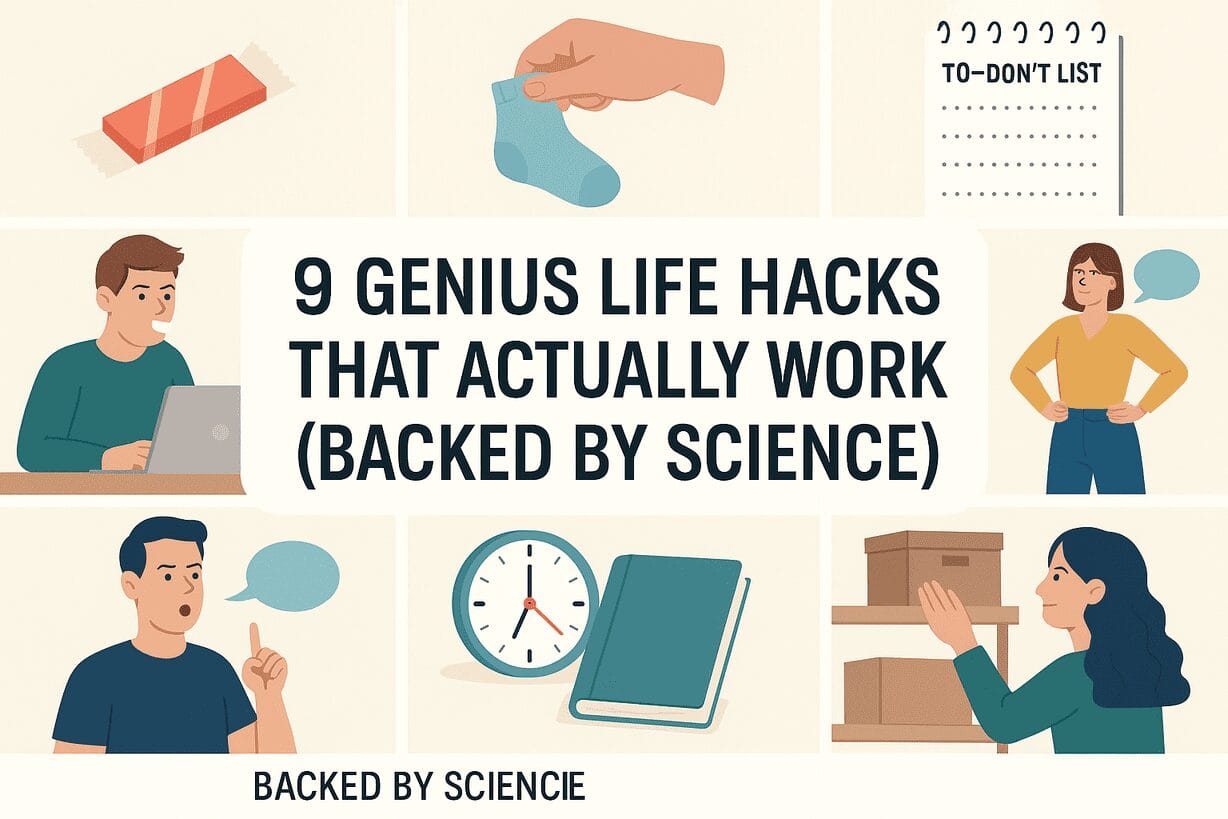Table of Contents
9 Genius Life Hacks That Actually Work (Backed by Science)
We’ve all seen those flashy life hack videos online—the ones where someone uses a paperclip to open a wine bottle or turns a soda can into a phone speaker. Entertaining? Sure. Practical? Not so much. But some hacks do hold up, especially when there’s science to support them. Here are 9 genius life hacks that actually work—and why, according to research and psychology.
1. Chew Gum to Improve Focus
Feeling foggy while studying or working? Pop in a piece of gum. Studies have shown that chewing gum boosts alertness and memory recall. One theory is that the act of chewing increases blood flow to the brain, helping you concentrate better. It also reduces stress, which in turn improves cognitive function.
2. Make a To-Don’t List
You’ve heard of a to-do list—but a to-don’t list can be just as powerful. Write down distractions or bad habits you want to avoid (like checking your phone every 5 minutes or saying “yes” to everything). This primes your brain to stay focused and reinforces self-awareness, a key aspect of productivity psychology. Psychology Today explores this in depth.
3. Sleep with Socks On
Struggling to fall asleep? Wearing socks to bed might help. When your feet are warm, your blood vessels dilate—a process called vasodilation—which helps your body cool down. That drop in core temperature signals to your brain that it’s time to sleep. The National Sleep Foundation backs this up.
4. Use the “20-Second Rule” to Build Better Habits
Want to make a new habit stick? Make it easier by placing it within 20 seconds of your reach. For example, keep your workout clothes near your bed or place a book on your pillow as a bedtime reading cue. The less effort it takes to start, the more likely you are to follow through, what a life hack. This comes from Shawn Achor’s research in The Happiness Advantage.
5. Talk to Yourself (Out Loud!)
It may feel a little awkward, but speaking to yourself out loud can improve problem-solving skills and memory. It helps you focus your thoughts and process information more deeply. Just try not to do it in a crowded elevator.
This life hack may seem unconventional, but verbal self-talk can enhance cognitive functions, including problem-solving abilities and memory retention. This strategy encourages mental focus and facilitates more profound information processing. However, it is advisable to exercise discretion in its application, particularly in public settings.
6. Label Emotions to Tame Them
When you’re feeling overwhelmed, naming your emotions can reduce their intensity. Simply saying “I feel anxious” or “I feel frustrated” activates the prefrontal cortex—the part of your brain responsible for reasoning—and calms the emotional centers. This is called “affect labeling”, and it’s backed by neuroscience from UCLA.
A nice life hack is acknowledging your emotions can lessen their impact, such as stating I feel anxious or I feel frustrated, which engages the prefrontal cortex and soothes the emotional regions. Referred to as affect labeling, this technique is supported by research from UCLA,
7. Use Blue Light in the Morning, Avoid It at Night
Blue light isn’t all bad. In the morning, exposure to blue light (like daylight or a bright screen) helps wake up your brain and resets your circadian rhythm. At night, however, the same light disrupts melatonin production and messes with your sleep. Harvard Health explains why blue light timing matters.
8. Stand Like a Superhero for Confidence
It might feel silly, but striking a “power pose” (like standing tall with your hands on your hips) for just two minutes can boost confidence and reduce stress. It’s called embodied cognition—your body language can actually change how you feel. Amy Cuddy’s TED Talk and her Harvard research made this famous.
9. Declutter for Mental Clarity
Your brain has a harder time processing information in a cluttered environment. A tidy space literally frees up mental energy, making it easier to concentrate and make decisions. The visual chaos of messiness leads to cognitive overload. Princeton University demonstrated this in their neuroscience study.
Your brain has a harder time processing information in a cluttered environment. A tidy space literally frees up mental energy, making it easier to concentrate and make decisions. The visual chaos of messiness leads to cognitive overload. Princeton University demonstrated this in their neuroscience study. Incorporating scientifically backed life hacks like decluttering can significantly improve your cognitive function and overall well-being.
Final Thoughts
Not all life hacks are created equal—but these are backed by science, not just internet hype. Whether you’re looking to be more productive, sleep better, or just feel more in control, small changes can make a big difference. So go ahead, chew that gum, stand like a superhero, and build the smarter version of your life—one life hack at a time.
Enjoyed this article? Share it or leave a comment below. And don’t forget to check out more wellness and productivity hacks here on The Daily Mesh:
- 12 Mind Blowing Facts You Won’t Believe Are True
- 10 Secrets Airlines Don’t Want You to Know
- 7 Things You Should Stop Doing By 30 (And What To Do Instead)


